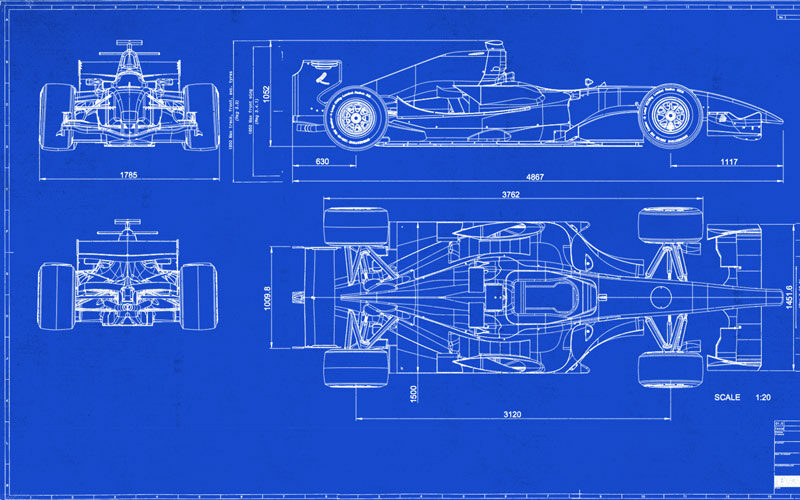In 1958, 4 Formula 1 drivers out of 80 were killed. Drivers entered the sport with a 5% chance of fatality. Now, we’ve gone 28 years with just 1 fatality.
Every member of the racing team has a role and a voice. Every effort is unified. Mistakes are not punished. When they can result in death, people must be permitted to admit, ruthlessly dissect, and correct them.
The entire concept of F1 is based on two things: marginal gains, and relentless improvement.
When drivers win by split seconds, feats of engineering need to be made on an almost molecular level to gain the advantage. The world record pitstop time is 1.82 seconds (held by Red Bull). Every process is perfected, every nut and bolt is considered, every circuit is precision engineered.
It’s almost the opposite to how many corporate businesses are run. There are a few ways things might be better if we as founders learn from the crowning jewel of motorsport.
Share your vision
In F1 the goal is to win. In a business organisation, that goal is less crystallised. Teams can drift onto dangerously different pages. Departments can end up working against one another (a classic example being finance against marketing). Juniors and admin staff who contributed to successful projects go uncelebrated. Relevant parties are left out of reviews.
F1 races are won through complete unification and orientation on a singular goal. In debriefs, every member of the 50-odd racing team gets a say.
Naturally this sense of togetherness is easier to foster in the context of world championships. Gold cups, champagne ceremonies and glory are fast unifiers. In corporate environments, it’s slightly less exciting. That’s why your internal brand values must offer genuine value, excitement, and a reason for participating to your staff – i.e. something beyond a paycheck (although that’s important too).
Scrutinise performance
We get it, constant review and analysis is irritating and time consuming. If something’s ostensibly working, why interrogate it? But the more data you gather, the closer you get to that marginal gains effect of through-and-through excellence.
In F1 race analysis, telemetry sees as many as 120 sensors rigged onto cars to gather information about everything. Everyone can view the data feeds, including the drivers between qualifying sessions.
In your business, if a system or strategy exists, observe, test and recalibrate it as thoroughly and perpetually as your bandwidth allows. With the progress and affordability of AI, ML, and cloud software, there’s no reason you can’t rig your business up with tracking metrics like sensors on an F1 car.
Example: you’re getting good website traffic and converting 10% of visits into sales. Things are ticking over nicely. But all of your buyers are coming from a specific location. Anyone who discovers your site accidentally isn’t being efficiently guided towards the product page. You’re missing out on spontaneous sales because you’re not evaluating a process that’s “working”.
Constant innovation
Formula 1 shares the company of the aerospace industry and the military as a pinnacle of technical development and innovation. They’re not afraid to try new things, even if they look stupid and don’t really work in theory (look at the 6 wheeled car).
Sometimes it’s the zaniest innovation for the sake of innovation that propels you from level with the competition to an entirely different league.
Respect the competition
British American Racing debuted in the 1999 Australian Grand Prix. Lead designer Adrian Reynard declared the BAR 01 would win the first race of any championship it entered. The team spent USD $6 million on the BAR 01. Not only did it not win, it didn’t score a single point.
Ferrari debuted in 1950. Mercedes in 1954. McLaren in 1965. BAR did not respect the decades of testing, failing, and reiterating its competitors had in advantage.
Ego plays a role in any sport. World champions don’t compete for themselves, they compete to be the best. Ego can take you some of the way, but when it starts to tell you you’re better than everyone else, it’ll trip you up.
Never assume you have the best offering, or that you’re too far ahead to overtake.
Have a plan B
Risk for every race is meticulously assessed ahead of time. The variables on the day (weather conditions, air temperature, driver wellness), can change things. Racing teams have a plan A and plan B they can switch between mid-race by communicating over the radio.
Once your business has launched in the market, it’s not just about the weather. There are hundreds more factors, many of them unpredictable, that can affect your success. You might’ve heard these referred to as ‘black swan’ events. You’ll need to be agile enough to jump into them quickly.
Keep it in a locked drawer if you need to, or in an alarmed safe labelled ‘FOR EMERGENCY USE ONLY’ if it makes you feel better, but you need to have a blueprint drawn up for a pivot, diversification, or acquisition should all else fail.
We’ll finish with a difference between Formula 1 and foundership.
An entire year is spent developing an F1 car, and the race is over in 90 minutes. There are 8760 hours in a year, making the development stage 99.99% of the process. This is because teams cannot enter the most prestigious race in the world with an MVP.
Startups can.
Almost all of the above advice applies to both pre- and post-launch. You don’t have to have every nut and bolt in the perfect position. Get an MVP to the market, and start iterating while you gather customer feedback, adapt, and (hopefully) start to turn revenue.
In the words of Daniel Ricciardo, “Sometimes you’ve just got to lick the stamp and send it”.










